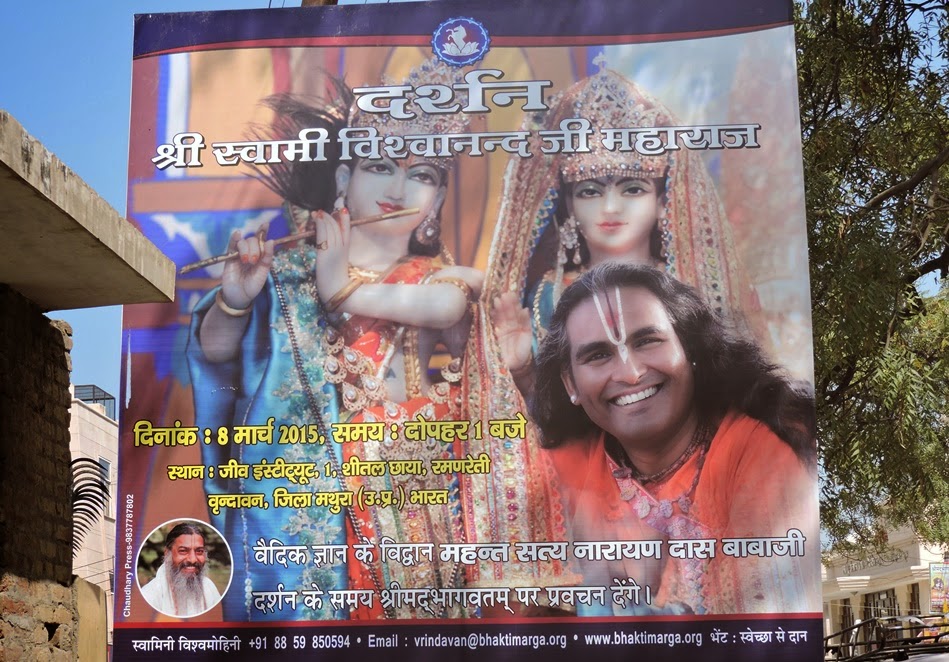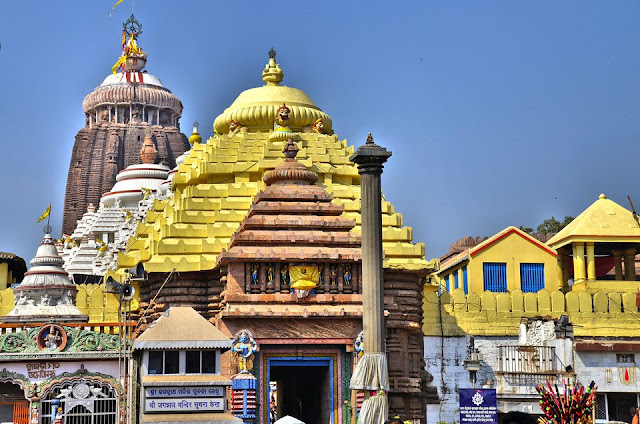Madhusudano'pi
I was actually a little sick for most of the day and took a couple of naps. But I went to my Rādhā-rasa-sudhā-nidhi class after making the previous post and feel much the better for it.
We are, as I said, discussing the first verse still, which is--
yasyāḥ kadāpi vasanāñcala-khelanottha
dhanyātidhanya-pavanena kṛtārtha-mānī
yogīndra-durgama-gatir madhusūdano'pi
tasyā namo'stu vṛṣabhānu-bhuvo diśe'pi
The portion of the commentary we covered today was this, which I give in the Sanskrit for the afficionados, because I find it rather elegant--
अपीत्यसम्भावनाभासमुद्दीपयन् विशिनष्टि-योगीन्द्राणां शिवसनकनारदशुकादीनां दुर्गमा गतिर्यस्येति। उपायखिन्नत्वेऽपि तद्दौर्लभ्यद्योतनेन मृग्यानुग्रहत्वं स्वसाहसालभ्यत्वं च भावमात्रैकप्राप्तिकृतार्थीकरणं च व्यनक्ति। अत्र कृतार्थपदेन च प्रसिद्धैश्वर्योऽपि तल् लघूकृत्य स्वसंवेद्यसुखप्राप्त्या माधुर्यमग्न इति रसिकशेखरत्वं ज्ञापयति। तेन श्रीमत्याः परमसौभाग्योत्कऋसोऽनुज्ञाप्यते।
उक्तार्थं विशदयति-कदापीति। अनियतत्वकथनेन साधारणसमयेऽप्येवं तदा स्वोद्देश्यसमये तु किं वाच्यं तादात्विकानन्दस्य मद्धृदयमेव साक्षीति।
नियतसमयमाह-वनविहारे सौगन्ध्यलुब्धागतभ्रमरनिवारणार्थं वसनाञ्चलखेलनं क्वचिन् निलयनादिक्रीडावशेन सखीसन्निधानाभावात् स्वयमेव श्रमापोहार्थं वा पुष्पावचयादिप्रसादवशेन श्रान्तप्रियसुखार्थमिति वा तस्य च तादात्विकशोभैकमग्नतया सेवाविस्मरणं ज्ञेयम्। तदानीं तत्कृतवातेन वाञ्छिताधिकसिद्धिप्राप्त्या धन्यातिधन्यमननं प्रभुकृतप्रसादस्य दासैकजीवातुत्वात्।
And what delightful directions the vyākhyā took!

We are, as I said, discussing the first verse still, which is--
dhanyātidhanya-pavanena kṛtārtha-mānī
yogīndra-durgama-gatir madhusūdano'pi
tasyā namo'stu vṛṣabhānu-bhuvo diśe'pi
I bow down to even the direction which leads to the daughter of Vrishabhanu. The breeze that sometimes arises from the play of the movement of her clothes is so exceedingly fortunate that even Madhusudana himself, who is the unattainable goal of the great yogis, considers himself perfected by being touched by it. (RRSN 2)
The portion of the commentary we covered today was this, which I give in the Sanskrit for the afficionados, because I find it rather elegant--
अपीत्यसम्भावनाभासमुद्दीपयन् विशिनष्टि-योगीन्द्राणां शिवसनकनारदशुकादीनां दुर्गमा गतिर्यस्येति। उपायखिन्नत्वेऽपि तद्दौर्लभ्यद्योतनेन मृग्यानुग्रहत्वं स्वसाहसालभ्यत्वं च भावमात्रैकप्राप्तिकृतार्थीकरणं च व्यनक्ति। अत्र कृतार्थपदेन च प्रसिद्धैश्वर्योऽपि तल् लघूकृत्य स्वसंवेद्यसुखप्राप्त्या माधुर्यमग्न इति रसिकशेखरत्वं ज्ञापयति। तेन श्रीमत्याः परमसौभाग्योत्कऋसोऽनुज्ञाप्यते।
उक्तार्थं विशदयति-कदापीति। अनियतत्वकथनेन साधारणसमयेऽप्येवं तदा स्वोद्देश्यसमये तु किं वाच्यं तादात्विकानन्दस्य मद्धृदयमेव साक्षीति।
नियतसमयमाह-वनविहारे सौगन्ध्यलुब्धागतभ्रमरनिवारणार्थं वसनाञ्चलखेलनं क्वचिन् निलयनादिक्रीडावशेन सखीसन्निधानाभावात् स्वयमेव श्रमापोहार्थं वा पुष्पावचयादिप्रसादवशेन श्रान्तप्रियसुखार्थमिति वा तस्य च तादात्विकशोभैकमग्नतया सेवाविस्मरणं ज्ञेयम्। तदानीं तत्कृतवातेन वाञ्छिताधिकसिद्धिप्राप्त्या धन्यातिधन्यमननं प्रभुकृतप्रसादस्य दासैकजीवातुत्वात्।
Rapid translation: The word api (“even”) in relation to the word madhusūdano is used to create a feeling of the semblance of impossibility in attaining Radha. This is done by saying that he is an unattainable goal for the great masters of yoga like Shiva, Sanaka, Narada and Shukadeva. Though these yogis are frustrated about finding a way to attain Krishna, in order to further illustrate the unattainability of the [breeze from Radha’s fluttering cloth] it is revealed that [for Krishna] Radha’s mercy is to be sought out, that it is unattainable by his own stalwart efforts and that he can be successful only by attaining the bhava, or appropriate mood.
So the word “fully successful, one whose objectives have been attained” ( kṛtārtha), it is intended to show that though it is well known that Madhusudana is full of aiśvarya, he diminishes that aspect of his being in order to attain a happiness that can only be experienced by him personally, and becomes absorbed in his mādhurya. Thus he demonstrates that he is the rasika-sekhara, the topmost rasika. This furthermore reveals how Srimati Radharani enjoys supreme good fortune.
To make these conclusions clearer, it is said “sometimes” (kadāpi). This means that even in the ordinary course of events, [this breeze arising from the movement of her cloth has such an effect on Krishna], so what to speak of the times when she actually consciously [creates such a breeze]? “Only my heart is a witness to the joy that comes at that time.” [says the author]
Certain specific times when this breeze is produced: When Radharani is walking in the woods and a bumblee is attracted by her bodily fragrance and starts to bother her. Then Radha waves her orani in order to chase it away. Sometimes she is playing hide-and-seek in the forest and becomes separated from her sakhis, so she has to fan herself with her cloth in order to cool down. Sometimes after Krishna has picked flowers on her behalf and is fatigued, she wants to give him pleasure by fanning him; then he becomes so absorbed in her beauty at that moment that he forgets that he is her servant. Then he feels that he has received rewards far beyond what he expected or deserved and so considers that he is fortunate, most exceedingly fortunate (dhanyātidhanya). For receiving the mercy of one’s master is the only livelihood of the servant.
And what delightful directions the vyākhyā took!




Comments